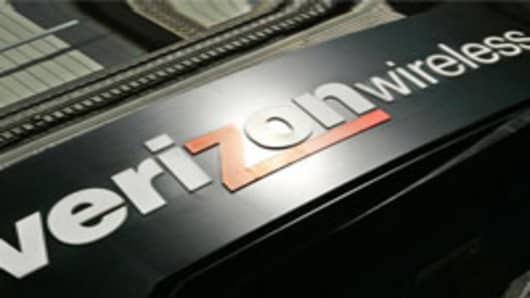Verizon Communications said on Monday its quarterly revenue rose due to strong wireless subscriber growth, although profit fell after merger-related costs and other items.
The second-largest U.S. phone company after AT&T also said it would increase its 2007 share buyback target by 25 percent to $2.5 billion.
"It's a story of tremendous strength in wireless and continued deterioration in wireline," said Sanford C. Bernstein analyst Craig Moffett.
Verizon Wireless, which Verizon Communications owns with Vodafone, added 1.8 million net retail customers in the quarter, taking total subscribers to 63.7 million.
Verizon's third-quarter net income was $1.27 billion, or 44 cents per share, compared with $1.92 billion, or 66 cents a share, a year earlier.
Excluding items such as merger integration costs, access line spinoff-related charges and international taxes, profit was 63 cents per share, a cent above the analysts' average forecast of 62 cents, according to Reuters Estimates.
Operating revenue rose 6 percent to $23.77 billion, close to the $23.6 billion forecast by Wall Street.
Verizon, like AT&T, has benefited from strong growth in mobile phone subscriptions in the past few years amid a decline in land lines.
It has also been expanding its FiOS high-speed fiber optic service, which allows the phone company to offer video. The service lets Verizon compete against cable operators' all-in-one packages of video, phone and Internet.
Verizon added 202,000 new FiOS TV subscribers in the third quarter, taking the total to 717,000. It added 229,000 FiOS Internet subscribers.
Bernstein's Moffett was unimpressed with the overall broadband subscriber numbers. Including DSL, which offers high speed Internet over traditional phone lines, and FiOS, Verizon said it added a net 285,000 new broadband connections.
"It raises the question whether the lion's share of gains from FiOS are simply cannibalization of DSL," he said.
The cost of deploying FiOS services hurt earnings by 9 cents per share, Verizon said. It said in September it expected to invest $18 billion from 2004 through 2010 to deploy the FiOS network.
Most analysts have said the investment, while costly, was necessary to offset a decline in home phone subscribers. But critics have said it was a risky bet, preferring AT&T's more cost-conscious approach that uses less fiber.
Verizon repurchased nearly $800 million of its shares in the quarter, and was increasing its 2007 buyback target by $500 million to $2.5 billion.
Its shares rose 20 cents to $45.80 in pre-market trade.


